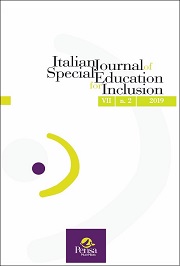Una panoramica generale dell'approccio svedese all’educazione inclusiva
DOI:
https://doi.org/10.7346/sipes-02-2019-11Abstract
This article is set to inform about the Swedish school system, parts of the Swedish teacher education, didactical considerations using co-teaching for inclusion and some ongoing Swedish
research about simulation training within teacher education for special needs teachers and ways to improve pupils reading skills. The work has been done as literature studies of earlier research
and regulatory documents as well as case studies of teacher education at Linköping University where they use simulation training and ongoing research in a municipality in Sweden where they
use response to intervention (RTI) to support pupils to become faster and more confident at coming up with answers to addition and subtraction problems. The case study about simulation training showed how simulations could be used to train the ability for teacher for special needs training and teachers for special educational needs ability to observe, a skill that is of great importance in taking stock of a situation and carrying out an investigation in school practices. The influence of the instructor/teacher when using different ways of teaching such as simulation was also showed. The case study about RTI showed that fewer pupils than expected have automatic recall of number combinations, which has the consequence that a larger group than expected will carry on practice with help of adapted computer program.


